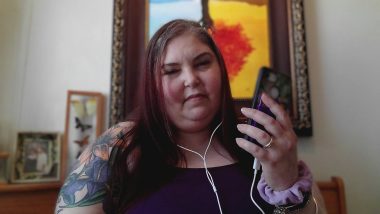Sarcoidosis Isn’t All in Your Head, but Therapy Can Still Help

I’ve been reading through my recent columns, and I noticed that I frequently mention how tremendously helpful therapy is. There are a few reasons for that.
When I started my blog in 2010, my goal was to help people. I thought that sharing how I got through difficult times would show other people with similar challenges that they could do the same.
Since then, I’ve been diagnosed with a number of incurable chronic illnesses, and become disabled as a result. I’ve lost friends, I’ve lost the ability to do many things, and I’ve lost what I thought was my place in the world.
When I think about how I’ve gotten through it all, a key factor is the work I’ve done with my therapist. I’ve learned to look at things from a different perspective, to reevaluate, and, most importantly, to accept myself and my feelings, however conflicted they may be. If I’m serious about wanting to help other people, the only way to do that is by being open and honest.
We need to break the stigma
For far too long, mental illness has been seen as something to be ashamed of, never to be talked about. Mentally ill characters are often either the villain of the story or the butt of its jokes. All that does is perpetuate the negative opinions people have, and make anyone who needs help less likely to seek it. My grandfather died by suicide when my mom was a little girl, and I can only imagine how different all of our lives would be if he felt like he could ask for help back then.
Things are starting to change in that regard, but we’ve got a long way to go. Earlier this year, tennis star Naomi Osaka and gymnastics phenom Simone Biles stepped back from competition and spoke out about their mental health needs. While many praised them for this, others criticized and belittled them for it. The more we talk about mental health, the more we normalize therapy, the healthier we become, both individually and as a society.
I was against it for so long
While my list of diagnoses keeps growing these days, for a long time, I couldn’t get even one. Though I was experiencing symptoms ranging from dizziness to fatigue and pain, those didn’t show up on lab tests, so doctors didn’t know what to do with me. Instead, they suggested that I was “just depressed.” I was dismissed by doctors for four years before visible symptoms developed.
Eventually, I found a doctor who believed me and worked with me to figure things out. It still wasn’t easy; I sometimes fought tears as I told her about the pain. When she suggested that I “talk to someone,” I was devastated. In my mind, she was joining the others in saying it was all in my head.
I fought her on the idea, but she suggested it every few months. One day, she explained it differently. She said that therapy could help me to cope with the reality of chronic illness, and to develop strategies to deal with how it affects every aspect of life.
It finally clicked that she wasn’t doubting me or my symptoms. In fact, she was acknowledging how hard it was, and telling me I didn’t have to go through this alone. I still wasn’t sure, but decided to give it a chance. I’m so glad that I did.
I spent most of my first appointment telling the therapist how much I didn’t want to be there, didn’t want therapy. Despite that, we somehow clicked. She got me to open up, and it was amazing to have someone really listen.

During the pandemic, Kerry attends therapy sessions virtually. (Photo by Kerry Wong)
Since then, my therapist has become one of my favorite people. With her help, I’ve gotten better at recognizing my own needs, establishing boundaries, and communicating with people in all areas of my life. I almost worry that I’ve come so far, she’ll think I don’t need her anymore. (Who am I kidding? I’ll always have more issues to work through.)
I share this so that people living with sarcoidosis and other chronic illnesses can see therapy as a legitimate and important piece of managing our disease, alongside our medical treatments. It’s not an either-or situation. Sarcoidosis isn’t all in our heads, but therapy can still help.
Around this time of year, it’s common for people, with or without chronic illness, to feel more depressed. Whether it’s the weather, the decreased sunlight, or the holidays that sometimes highlight what we’ve lost more than what we have, we need to acknowledge those feelings. While we often want to appear positive, it’s OK to not be OK. And it’s more than OK to ask for help.
***
Note: Sarcoidosis News is strictly a news and information website about the disease. It does not provide medical advice, diagnosis, or treatment. This content is not intended to be a substitute for professional medical advice, diagnosis, or treatment. Always seek the advice of your physician or other qualified health provider with any questions you may have regarding a medical condition. Never disregard professional medical advice or delay in seeking it because of something you have read on this website. The opinions expressed in this column are not those of Sarcoidosis News or its parent company, Bionews, and are intended to spark discussion about issues pertaining to sarcoidosis.








Theresa Govan
Kerry thanks for this much needed article. I have had Pulmonary Sarcoidosis for 42 years and have been a mental health therapist for 25 years. I am so pleased that you stressed the importance of having someone to listen to you during the difficult diagnosis period of this illness. In addition, therapy is becoming more acceptable as the stigma surrounding it is lessening. Continue to take care of yourself and think positive thoughts!
Theresa
🦋 Kerry Wong
Thank you, Theresa. As someone who both lives with sarcoidosis and supports people with their mental health, it means a lot to hear (read) this from you. The more we talk about it, the better it is for all of us. Sending those positive thoughts back around to you!
🦋